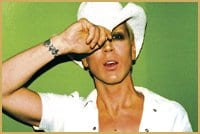For queer indie-pop-ska-punk musician R Kelly Clipperton, social progress for gays and lesbians in Canada can be measured by the number of tour dates he books.
“In one of my first bands in the late ’90s, I feared playing smaller places like Sudbury,” Clipperton says. “I wanted to stick to the more forward-thinking urban centres, but now I’m thrilled to do this tour.”
Clipperton and his backup group, The Kellygirls, are touring Canada on their Deus Ex Machina Tour of Love and Duty in support of their new album We Love You, But Not As Much As We Love Ourselves. The tour takes the group to 27 stops in nine provinces, including such off-the-beaten-path destinations as Charlottetown, Lethbridge, and Duncan.
But as much as society has changed, Clipperton still finds the music business reluctant to embrace queer performers.
“I would say that the industry–which is run by upper class, white, middle aged men–is not particularly supportive. Being a gay man in music is definitely that last taboo,” he adds. “Lesbians and dykes definitely had a head start on that. Women are generally more fluid, so lesbians can have a broader audience of women and men. Their sexuality tends to just fall away, but the thought of a gay man being entertaining, political, or thought-provoking still scares people.”
So, Clipperton says, the music industry leaves few options for gay men who want to break in.
“You have to take it over the top and be a sexless icon like RuPaul or Boy George to be accepted,” he says. “Boy George was a shock in 1982. The album was great, but his look jolted people into paying attention.”
Clipperton, whose new tour is only one part of a career that has included modeling, acting, playwriting, photography, and three different musical bands, says he finds great freedom to experiment with his latest outfit, The Kellygirls.
“In the past, some bands I’ve been in have sort of nailed down a sound, and you don’t feel free to move out of it. But I need constant change in my life to keep everything fresh,” he says. “Stylistically, the Kellygirls’ sound doesn’t really fit into one envelope.”
Pressed to latch onto a genre, Clipperton is momentarily lost for words.
“Pop music really sticks in your head, and that’s the sort of stuff I write,” he says. “The trumpet and sax add so much to things. The horns kind of take it to ska, big band and some of the early punk, but we’re not really that rough around the edges. I think it’s actually the greatest culmination of everything that I’ve done,” he says.
One thing is clear: Kelly and the Kellygirls’ stage personas are much more similar to Boy George than they are to George Michael. In his stage shows and music videos, Clipperton and his backup band present hypersexualized, gender-bending performances for their audiences.
“I suppose the gender confusion in my presentation is more thought provoking than anything,” he says. “Within the queer community, there are brackets. As much as we like to think that we are a forward-thinking people, there are stereotypes. I’ve realized through my travels and experiences on this planet that I don’t fit into those stereotypes.”
And Clipperton isn’t shy about naming his influences in pursuing this line of performance.
“I’ve definitely been attracted to Dave Navarro,” he says. “He’s an incredibly sexy man, but he looks great in tons of eyeliner. It’s something I’ve always been attracted to.
“I have to say hooray for the Scissor Sisters. I’m glad they’ve managed to get the respect of their audience without having to temper their message while being open about their sexuality,” he adds.
But in the end, Clipperton maintains that it’s all about entertaining the audience.
“You go to Madonna and you get a big show, but when you go to a smaller venue, you don’t get that much of the spectacle,” he says. “I wanted to keep the fun there.”
Clipperton also says that getting closer to the audience is the advantage of playing to the smaller venues that make up his current cross-country tour.
“What I like to see when I’m on stage is people letting go, releasing whatever it is that people need to get out of their system,” he says. “I love it when people come up on stage dancing with me and shouting things at me. I just go off on it.”
The fans seem to be responding to the Kellygirls’ live performances. Almost to answer Clipperton’s old concerns about hitting Canada’s smaller towns, the crowd response to the band’s third tour date in Peterborough, ON was electric, Clipperton says.
“The crowd was hooting and hollering the whole time,” he says. “I flashed my midriff to people and they all cheered. I just said to them, ‘Do you not have porn here?’ They were really fun.”


 Why you can trust Xtra
Why you can trust Xtra


